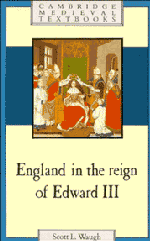Part II - Economic challenges
Published online by Cambridge University Press: 05 June 2012
Summary
Paying for war in medieval England was problematic for three reasons. One was that there was no routine taxation, a problem that will be taken up later. Another was that the medieval economy did not produce a huge surplus over and above what was strictly necessary to keep society going. Finally, there was a brisk competition among the crown, barons, and church for a share of that surplus. Early fourteenth-century England was prosperous, but the wealth was limited. In this section, England's economic base, from village agriculture to overseas trade, will be examined in order to understand the economic constraints that Edward faced when he embarked on war.
The crucial fact was that the surplus was no longer growing. War, weather, and disease caused violent economic shifts and brought a long period of expansion to a close. A decade and a half of strong economic performance ended in 1315 with poor weather and famine. Grain production soon recovered, but a severe deflation between 1336 and 1342 hurt producers and made it harder to pay taxes. Yet these events paled in comparison to the plague, which first arrived in 1348 and struck again in 1360–1, 1369, and 1374. Altogether, nearly one-half of the population perished. In the 13 50s, between bouts, the economy was buoyed by high prices and favourable trade conditions. During the 1360s and 1370s, however, the effects of the population loss began to make themselves felt.
- Type
- Chapter
- Information
- England in the Reign of Edward III , pp. 21 - 22Publisher: Cambridge University PressPrint publication year: 1991

